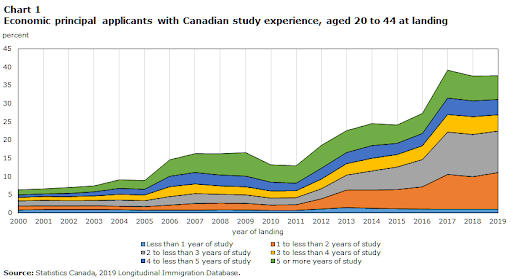The Migrant Workers Alliance for Change is criticizing Canada’s decision to slash 2022 and 2023 admissions of high-skilled immigrants through the Express Entry program, which they say is the only pathway to permanent residence for most of nearly 780,000 migrant student workers in Canada.
“Tens of thousands will be forced to leave Canada or become undocumented,” warns the Alliance, which is also coordinating a petition to Prime Minister Trudeau to end the 20-hour work limit on study permits, among other demands.
The Express Entry path for federal high-skilled workers for 2022 was cut in half, to 55,900 from the previously announced 110,500 spots, according to the federal government’s immigration levels plan for 2022-2024. The target for 2023 is now 75,750.
The decision seems to clash with the fact that Canada sees international students as “well positioned to apply for permanent resident status” on account of their “strong employment and language skills, bolstered by their Canadian education and work experience,” and relies on them for labour supply.
International students as a source of labour supply
A recent study by Statistics Canada has confirmed that the share of new economic immigrants with Canadian study experience has been increasing steadily in the past two decades, growing from six per cent in 2000 to 38 per cent in 2019.
The researchers also found that in the first two years of immigration, economic immigrants with Canadian study experience earn considerably more than those who did not study in Canada.
This advantage was due entirely to their better command of the official languages and much higher rates of pre-immigration Canadian work experience, according to the authors, including an Immigration, Refugees and Citizenship Canada researcher and an analyst with Statistics Canada.
According to the study, which analyzed people aged 20 to 44 at landing and admitted between 2000 and 2016, the government considers international students “a pool of skilled individuals.”
“International students in Canada are allowed to work while they study and, after completing their studies, to obtain a post-graduation work permit to gain Canadian work experience,” the study states. “They may then be eligible for permanent residency through one of several economic class immigration streams.”
The authors cited government data showing that “more than 58,000 graduates successfully applied to immigrate permanently in 2019, and their decisions to stay in Canada will help to address our stark demographic challenges.”
The study also found that 10 to 11 years after immigrating, economic immigrants with at least one year of Canadian study experience had significantly higher earnings than those without such experience, regardless of whether they had pre-immigration Canadian work experience.

Migrant students speak out
But as the federal government cut the Express Entry intake targets for the coming two years, current and former international students allied as Migrant Student Workers are speaking out.
As of Dec. 31, 2020, there were a total of 778,560 study permit holders and post-graduate work permit holders in Canada, making them “the largest group of temporary migrants in the country,” advocates from the organization said in a press release. “The Express Entry program is the only pathway to permanent residence” for most of them.
“To qualify, migrant student workers must have completed at least one year of high-waged work,” which was impossible for many due to the pandemic,” the organization argues,
Minzi, a former international student in Toronto cited by the Alliance in a separate press release, confirms: “I worked as a server for two years just to make ends meet, I was an essential worker who kept working when others didn’t, and now my permit is expiring.”
With half as many spots in the Express Entry program, tens of thousands of students will not be able to complete the increased requirements and will be forced to become undocumented or leave the country, the Alliance warns.
“Immigration rules limit the number of hours that migrant student workers can work, even as COVID-19, and now the war in Ukraine, has created a global economic crisis and many migrant student worker families are unable to support them,” the statement reads.
The Alliance, which also supports farm workers and immigrants with precarious status, pointed out that in 2020 international student tuition increased seven times more than domestic tuition: while the former rose by 7.25 per cent, the latter only increased by 1.65 per cent.
On March 10, Migrant Students United held a virtual call to action to demand renewable post-graduate work permits, an end to the 20-hour work limit on study permits, and access to permanent resident status so that students can live and work in Canada with equal rights.
The value of Canadian study experience
The federal government recognized the value of Canadian study experience by adjusting its ranking system for economic immigration applicants in November 2016. The government included 15 points for a one- or two-year diploma or certificate, and 30 points for a three-year degree, diploma or certificate from a Canadian educational institution.
In 2017, the share of newly admitted economic immigrants who were former study permit holders peaked at 39 per cent, then slightly levelled off to 38 per cent in 2019, the Statistics Canada study indicates.

The study concludes that “rising shares of economic immigrants with Canadian education occurred “alongside increasing numbers of international students and the implementation of immigration programs designed to admit economic principal applicants with Canadian study experience.”
Lorena Martinez is an international student advisor at Canada Es, an organization that guides international students to help them get admitted into Canadian colleges and universities.
According to her, “having studies in Canada definitely opens the doors for the Canadian Experience Class (CEC) and for job opportunities because the colleges and universities prepare them not only in the matter of language, but they also learn about the Canadian work culture.”
In an interview with New Canadian Media, she said 70 per cent of her students have settled successfully in Canada with well-paying jobs in their areas of study. However, 30 per cent don’t and are forced to return to their countries.
Additionally, Martinez notes, while international students are allowed to work part-time during their studies, it is “not enough to pay their living expenses and tuition…(and) they are sometimes abused by employers who pay them the minimum wage.”
Isabel Inclan has worked as a journalist for more than 20 years, in both Mexico and Canada. She began working as a foreign correspondent in Canada in 1999 for Mexican media. She has been a New Canadian Media contributor since 2018. Her main areas of interest are politics, migration, women, community, and cultural issues. In 2015, Isabel was honoured as one of the “10 most influential Hispanic Canadians.” She is a graduate of Masters in Communication and Culture at TMU-York University. She is a member of CAJ and a member of the BEMC´s Advisory Committee.





